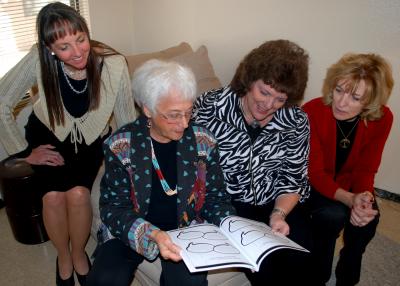NMSU's Child Advocacy Studies program earns regional training center designation

As one of 27 universities in the nation offering an academic program in Child Advocacy Studies, NMSU has further been selected by the National Child Protection Training Center as the first regional training center in the western United States.
NCPTC is establishing regional training centers throughout the United States in order to expand accessibility and availability of training and technical assistance to professionals who serve maltreated children. NMSU was selected unanimously by the NCPTC Board of Directors to operate the Southwest Regional Training Center in Las Cruces.
In accepting NMSU as a regional partner, NCPTC praised the work of the Southwest Institute for Family and Child Advocacy for their work training child protection workers around the state. They also noted NMSU Cooperative Extension Service's experience in delivering training and services over large, mostly rural distances and in working with under-represented and limited resource populations.
As a regional training center, NMSU will work with NCPTC in providing intensive training to prosecutors, law enforcement officers, social workers, nurses, doctors, psychologists and other professionals who respond to cases of child maltreatment. The Southwest Regional Training Center will serve New Mexico, West Texas, Arizona and Southern California.
In 2009, during a speech given in New Mexico entitled "Unto the Third Generation: A Call to End Child Abuse in Three Generations," NCPTC's director Victor Vieth challenged New Mexico universities to implement a Child Advocacy Studies academic program.
NMSU faculty and staff members from the College of Health and Social Services, College of Agricultural, Consumer and Environmental Sciences, College of Education and community child protection professionals took the challenge and began developing a curriculum and program that has evolved into NMSU being selected as a regional training center.
"We are addressing the issue of child abuse and neglect from an interdisciplinary perspective," said Esther Devall, head of NMSU's Family and Consumer Sciences department. "We want to train anyone who would be involved in working with children and families. Students from all majors need to know more about child maltreatment."
The Child Advocacy Studies students receive training in how to recognize and appropriately respond to abuse and neglect, how to conduct an investigation, and how to interview different age children.
Ultimately, NMSU will develop a state-of-the-art laboratory training facility that will include mock child abuse investigation houses, medical facilities, courtrooms and forensic interview rooms that provide a real world experience to students and professionals.
"While there is legislation before Congress to finance these centers, at this time there is no funding," Devall said. "That is part of our commitment to NCPTC, to raise the funds. We will be asking university employees, alumni, businesses, and community advocates to help support the work of the regional training center."
In the meantime, NMSU's Child Advocacy Studies program has established the training areas in existing campus facilities.
"Our students need to be able to walk into a home and see signs of abusive behavior," Devall said. "We have turned a house in the Family Housing complex into a mock house that is staged as a typical home with 'props' that would indicate abuse may be occurring."
A key part of the training is focused on how to interview children in a way that will not traumatize the child. The interviewer must know how to ask developmentally appropriate questions that don't lead the child in a particular direction or implant memories by the way in which the questions are asked.
"You need an interview space that is inviting and comfortable yet has cameras to record the interview," Devall said. "We are using the family therapy rooms at the Family Resource Center to teach interviewing skills."
Finally, the trained professional will have to appear in court to testify about their investigation findings.
"We will adapt rooms in Corbett Center to serve as mock courtrooms during training events," Devall said. "When possible, we may be able to use space in the Third Judicial District."
The Southwest Regional Training Center will provide a wide range of educational, training and support services to professionals across the four-state region.
"The training center will be responsible for promoting and developing Child Advocacy Studies programs at other colleges, universities, seminaries, medical and law schools within the region," Devall said.
"One of our goals is to assist counties in forming multi-disciplinary teams, which would include prosecutors, child protection workers, law enforcement officers, health care professionals, victim advocates and educators. The teams meet regularly to review cases as they proceed through the criminal justice system," Devall said.
"That would involve a team from each county attending the training. Economically, a local government would not be able to send their team to a national training, but with the Southwest Regional Training Center in New Mexico, teams could afford to either send the team to NMSU or request that the MDT Trainer come to them. "
A third responsibility will be to work with communities in providing community-based child abuse prevention programs. NMSU is already providing part of this outreach with its Cooperative Extension Service's Strengthening Families Initiative parenting program that annually impacts 300 families, and the Southwest Institute for Family and Child Advocacy program that trains nearly 5,000 child protection professionals each year.
"Child abuse and neglect is something that people care about and recognize as important, especially since the Penn State scandal," Devall said. "It will take all members of the community to eliminate child abuse in three generations."
In New Mexico, all adults, not just teachers and medical professionals, are mandated by law to report their suspicions if they think child abuse and neglect are happening. Once the suspicion is reported, professionals investigate and determine whether there is a problem.
"This is where our Extension county offices will come into play," Devall said. "We would like them to establish awareness programs and teach their community members about identifying and preventing child abuse."


